One Queen’s Highly Personal/Subjective Reaction to Taylor Mac’s A 24-Decade History of Popular Music
1. All efforts to recapture the experience are failures.
2. Failure is a virtue. Sarah Garton Stanley: “Once you’ve failed to be male enough or punctual enough or whatever the criteria you’ve been proven to have failed against, then you can just exist.”
3. Having acknowledged that, we can move on.
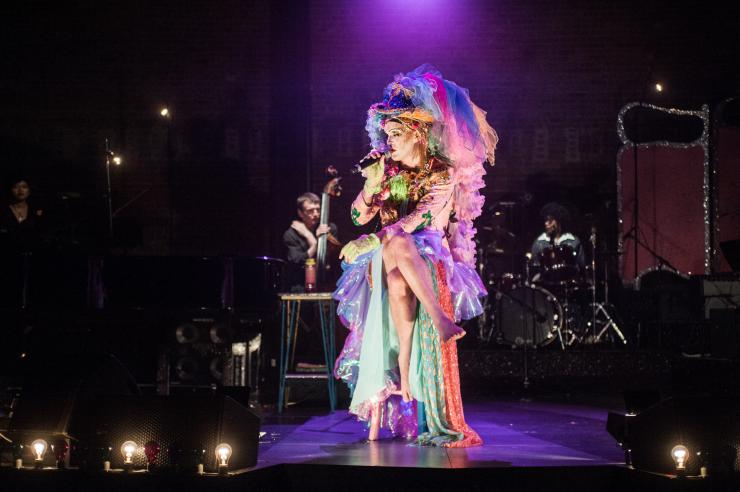
4. At about 12:17 p.m. on Saturday, 8 October 2016, the lights dimmed in St. Ann’s Warehouse, under the Manhattan Bridge. At once, as one, six hundred queers and friends of judy erupted into applause; a twenty-four-piece orchestra began to play; and Taylor Mac made a fabulous, triumphant entrance from the back of the house and began a performance art concert that did not stop until after 12:00 p.m. the next afternoon.
5. “This show is long!” bellows Time with her head stuck in a clock nailed to the wall at the top of The Lily’s Revenge, previously judy’s longest and most spectacular project, at five hours, with a cast of around thirty-five. I cut rehearsal and took a guy to see Lily in 2012, when it was at Harvard; at dinner after the show, he had nothing at all to say about it. He looked like he’d been through combat. We didn’t last.
6. —judy is Taylor’s pronoun. Camp genuflection to Garland, the goddess of midcentury fagdom (though why forget Collins, Holliday, Kaye, Kuhn, Chicago?), but also a rather brilliant linguistic logjam, forcing you to accommodate the spaciousness and ridiculousness of a two-syllable pronoun.
7. This essay is also long.
‘A 24-Decade History of Popular Music’ is a twenty-four-hour performance art concert in which Taylor Mac, along with scores of musicians and two dozen ‘Dandy Minions,’ performs the evolution of popular song in America from 1776 to 2016.
8. Like gay sex in the 1980s, enormously lengthy works of theatre are not safe enterprises. They can’t be. These near-mythic colossal ones come along rarely, and it’s even more rare that one can clear the time to succumb completely to the experience. For as long as you’re in the room with them, they demand your attention. There’s nowhere to hide: the show just keeps happening. It’ll exhaust you. It’ll frustrate you. It’ll threaten to devour you whole and leave nothing behind, and you might even gladly acquiesce, because you’re going to pieces anyway either from bliss or boredom. (Thoreau: “The cost of a thing is the amount of what I will call life which is required to be exchanged for it.” You will want it to end. You will never want it to end. It may seem like it will, indeed, never end. It ends. You as an audience member at a marathon show are much more necessary than at a two-hour-and-twenty-minute realistic four-hander with a unit set. In Great Lengths, his study of contemporary marathon theatre from Nicholas Nickleby to Forced Entertainment and everywhere in between, Jonathan Kalb proposes that any lengthy work of performance that purports to be “theatre,” regardless of its venue or form or adherence to narrative, shares DNA with endurance performance art (Marina Abramović, Tehching Hsieh): both are “deeply and riskily concerned with the experience of the body in time and space” [emphasis mine].
9. At the top of the third hour, Taylor, having changed into the third outfit (there was a different Machine Dazzle ensemble for each hour/decade), appeared on a ledge in front of a curtain twenty feet in the air, extreme house left. The look: a bloom of wine corks on wires as a wig; lacy gloves; and a crocheted trash-dress covered in sex toys. This would be a decade of drinking songs. Taylor started to tell a story about a frat party judy had been invited to once after a performance at Dartmouth. The party—in particular, its fetid basement—had reminded judy of a particular relic of gay history. “In New York in the seventies and eighties,” judy said, even though judy wasn’t there (though neither was I—no matter, it’s in the queer archive: “not simply a repository…a theory of cultural relevance, a construction of collective memory, and a complex record of queer activity”—Jack Halberstam, “there used to be a bar called the Mineshaft.” Pause for effect. (The whoop you heard here, if you were in the room, was me.) “And in the men’s room of the Mineshaft,” judy told us, “they didn’t have urinals; they just had a naked man in a bathtub.” Pause for reaction. We reacted. Judy, chuckling: “Half of the room just said, ‘Yeah, sure, whatever, fine,’ and the other half said, ‘No. Noooo…’” Nervous laughter. Then judy said: “They want you to think we’re all Ellen, but we queers are some kinky motherfuckers.” Loud cheers and dissembling, again especially from me. Then judy stepped down from the ledge, and the band played on, and the history of America continued, the Mineshaft and its men’s room and all.
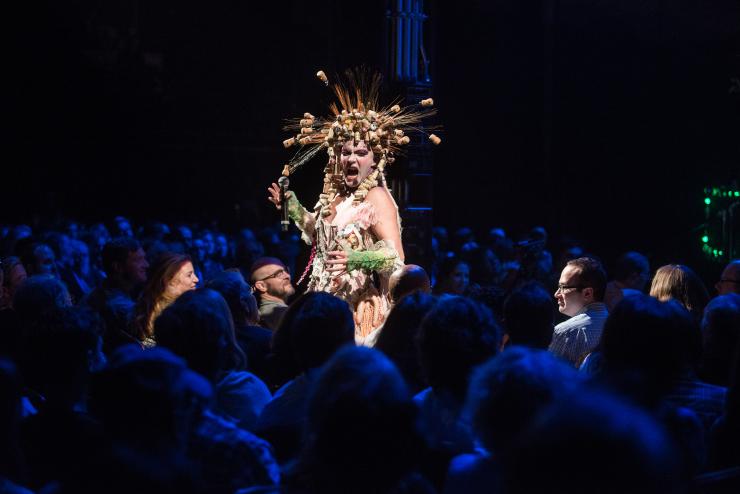
10. In case you weren’t there—whether for the marathon, the eight different three-hour concerts Taylor gave at St. Ann’s leading up to the marathon, or any of the dozens of work-in-progress performances judy gave around the world during the six-plus years it took to develop the full show—A 24-Decade History of Popular Music is a twenty-four-hour performance art concert in which Taylor Mac, along with scores of musicians and two dozen “Dandy Minions,” performs the evolution of popular song in America from 1776 to 2016. There is an agenda to the set list: judy intends to wrest control of the narrative back from the dominant modes of power (often patriarchal and racist), which have suppressed Others in the United States for the past 240 years (and earlier, and in the present). Each decade gets an hour, and often a unifying theme: 1846–56 imagined a smackdown between Stephen Foster and Walt Whitman for the title of the Father of American Song (Foster didn’t stand a chance: we pummeled his effigy, a game audience member, with ping-pong balls, while alt-stripper royalty James Tigger! Ferguson mashed his jock in the poor [lucky?] guy’s face); 1876–86 inverted Gilbert and Sullivan’s Mikado and reset it on Mars to remove any traces of cultural appropriation and orientalism (this act was bizarre: vocoders and blacklight spaceships and the refrain of “Tit-Willow” chanted ad infinitum delirium); 1976–86 was a backroom sex party. From the first song to the last, Taylor incorporates the audience into the show through oftentimes radical strategies of participation, many of which, delightfully, tip into the erotic. (One thing we queers tend to do at least to some degree when we get in a room together: we cruise.) From 1816 to 1826, we were all blindfolded (to celebrate the invention of braille) and invited to participate in a series of hobbled seduction rituals with our neighbors; ninety years later, in the middle of the night, a stranger spooned me onstage (an experience I shared with most of the men in the audience: we were away from home in World War I!) while Taylor sang “Make Me a Pallet On Your Floor”; by morning I found myself completely broken down, slow dancing with an attractive bear, sobbing into his shoulder, it was the 1970s (my emotional Achilles’ heel) and the entire room was the gay prom we never had, I sobbed and he held me and I held him and later he told me I was the first man he’d ever danced with—
11. It was a radical faerie realness ritual sacrifice.
12. “Everything you’re feeling is appropriate!” Taylor said over and over.
13. A twenty-four-hour show—a twenty-four-hour impermanent collapsible community of majority-queers—is long enough (“finally,” breathes the size queen) to contain a different show for every single person in the audience. A queer friend of mine says that one of their main objectives as a performer is to give a gift to a single person in the audience, at least, at any given moment—and everyone else benefits through witnessing that ritual of generosity. Judy gave us a gift every few seconds and we were all there for all of them.
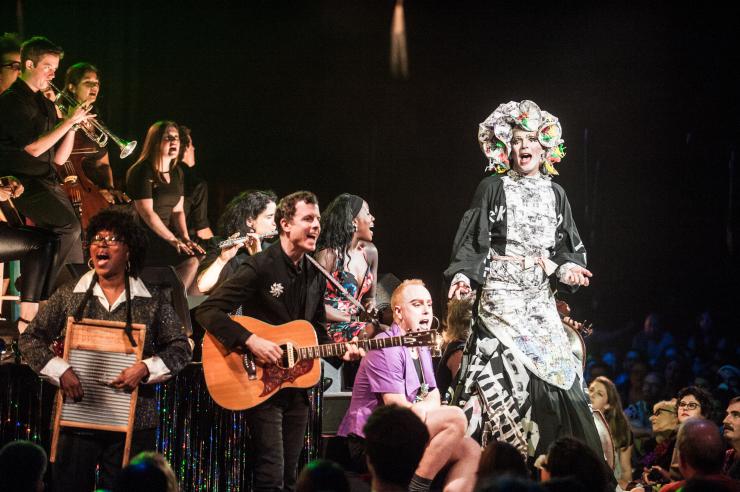
14. I am ruined, as I said, for all other theatre that isn’t made by Taylor Mac now. I’ve been biting the bars of that gilded cage for ages now—how stale and unnecessary realism is compared to what we can really do on stage—and A 24-Decade once and for all burned the fourth wall to the ground. If you don’t acknowledge me as an audience member—all of us in the room as a community brought together for a vital, wonderful purpose—I don’t have time for your glorified television show. But people still make and want to see that stuff. Guess I’m just queer to the hilt—but not alone: “Sometimes in the theatre,” Taylor lamented around hour five, “if you want to do anything other than straight realism, it’s like trying to have sex with someone who wants to put on ten condoms.”
15. Gay and queer theatremakers of the world: Are you tired of the near-total infestation of queer theatre by the pernicious forces of realism, of their realism? Theatre is and has always been our province and tool for subversion. We cannot let our artists toil in realism! “Unscrew the locks from the doors! / Unscrew the doors themselves from their jambs!” (Whitman knew, queen that he was, all the way back in 1855.) We cannot let our regional theatres (and their audiences and their donors) dictate what stories gay and queer and trans playwrights can tell. We must make queer art on our own terms.
16. Not just that: We need to show up for each other. We need queer collectivity now, just like we needed it on 28 June 1969, and at every ACT UP demonstration, and at every ball and zap and Black Party and tea dance and march, march, march. There is something very powerful that occurs when queer people gather together and make a room full of themselves: our right to exist, and our individual weirdnesses, curiosities, and inversions, can no longer be denied. We charge each other up. We may be “Preaching to the Converted” (as David Román and Tim Miller write in their seminal 1995 essay), sure, but “to dismiss queer performance as preaching to the converted presupposes that we, the converted, no longer need occasions, events, and rituals where members of our community profess and perform to us their beliefs so that we in the assembled crowd can take these performances and incorporate their insights into our own continuing struggle to live in a deeply homophobic world.” Because I saw male-adjacent people wear makeup and dresses and skirts made of gay porn and chip bags (and, in other queer spaces at other times, leather and rubber and uniforms and nothing at all), I learned that not only could I wear the same things and sing the same special songs, but that doing so might set me free, make me whole, help me—us—survive.
17. It is so important to me that this show was about sex, that it spoke about it, spoke sex to power. You are powerful because you have sex—queer sex, anonymous sex, endless sex, backroom sex, sex in a tent, in the shower, in prison, in the bushes, in your house in the suburbs, in the tenements, on the roof, safe sex, unsafe sex, in the dressing room, in the lobby, in the bathroom, in the streets.
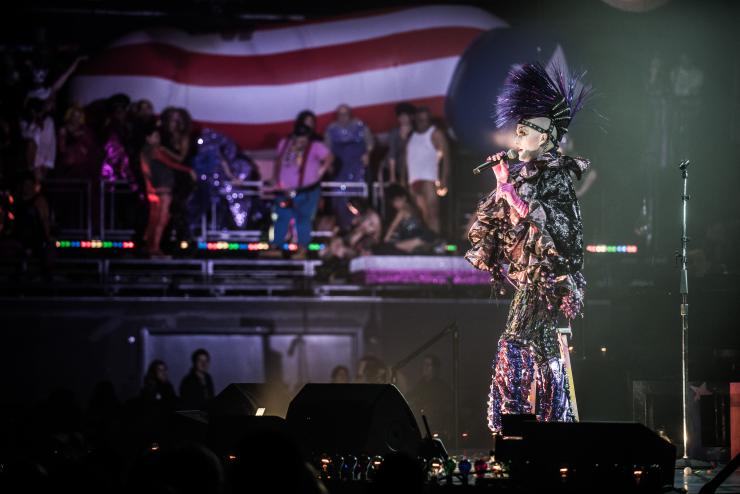
18. “I love anonymous sex,” judy merrily chirped around 1976. Then judy sang “Heroes,” the David Bowie classic, as a disco number. Those who have gay sex in public (as Taylor has and presumably still does, especially at the Cock, one of New York City’s [rather paltry, but beggars can’t be choosers] twenty-first-century answers to the Mineshaft) and talk about it are, judy suggested, heroes. This is especially true for those vanguard queers who invented new ways of living (and fucking), for the first time relatively out of the shadows, for that all-too-brief decade of total sexual freedom.
If we do not remember queer history (and remember it correctly: unsanitized, messy, inchoate, glamorous, scrappy, trash-strewn, aching, weeping, defiant), proto-gay children growing up in a post-gay-marriage world will think that that has always been the case, and it hasn’t.
19. If we do not remember queer history (and remember it in all its glory: messy, sloppy, inchoate, glamorous, scrappy, trash-strewn, aching, weeping, defiant), proto-gay children growing up in a post-gay-marriage world will think that that has always been the case, and it hasn’t. We have always been kinky motherfuckers—and not just in the bedroom; in our art, too. To forget this, or “clean this up,” is to behave as if history never happened, or has nothing to teach us. Taylor showed us that history is cumulative, that patterns of oppression repeat, and reify, and resist all but the most united fronts of community-based retaliation.
20. “No family is safe when I sashay,” warns the singer Perfume Genius in “Queen,” his twenty-first-century anthem for rebel queers. If you’re not sashaying—working your sparkly self through all the halls of the world—you’re not taking enough advantage of your queerness. Popular culture threatens to eradicate your queerness, to parlay whipped-up horror at “Masculine Women and Feminine Men” into suppression of difference. Remember that when the Angel pounds on his ceiling, Prior hollers back: “I am a gay man and I am used to pressure, to trouble.” It’s an amulet, not a liability.
21. The first song making fun of dandies in the show is, of course, “Yankee Doodle,” forty-five minutes in; the latest, in the 1970s (as gay lib starts to make wobbly this united front against limp wrists) is a gossamer rearrangement of a foul Ted Nugent song, “Snakeskin Cowboys.” This is baked into our culture, this opprobrium for male people who toe the line of weary gender roles. We as gays can even perpetuate it: we did it in the seventies (“No fats, no fems,” whined the Clones) and we’re still doing it today (gotta be “masc,” maybe even “straight-acting”). And to defy this—to fling those wrists every which way and claim your queendom—is a powerful, powerful thing, mary.
22. I want to clarify the kind of power I’m talking about here: not power on their terms, not the power to subjugate, strong-arm, bully, oppress, or bury. That kind of power, chained to capitalism, colonialism, imperialism, necessitates that when one body becomes more powerful, the bodies in opposition become less so. Queer power—which encompasses radicalism in gender, sexuality, mode of sex, style, class, occupation, size, color, art form—operates on a principle of abundance. It multiplies; it never subtracts. There is no limit to the number of queer bodies that can claim power. This power, too, is not the power to subjugate, strong-arm, bully, oppress, or bury, but the precise opposite: the power, through cultivation and performance of and pride in identity, to exalt, support, recognize, name, and love that which the brute forces aforementioned would rather bulldoze right through.
23. And the sheer variety of different genders and gender expressions in that room! There were glitterbears—great big bearded fairies in caftans. There was a daddy in leather suspenders. A butch woman in a yarness. All kinds of masculine women. Stem-to-stern drag queens. Genderfuckers, androgynes. Young gays, still growing. Straight couples, game for anything—they, too, are queer, at least these ones; they are absolutely in the club, I promise (I spent the Civil War with a sweet pair: he wore a satin cape and she borrowed my lipstick to draw on a mustache—all the female people had to be soldiers in drag). And to top it all off: Taylor Mac, whose clothes (by Machine Dazzle, a true genius) telegraphed neither male- nor femaleness, masculinity nor femininity, but judy’s chosen gender, which is performer.
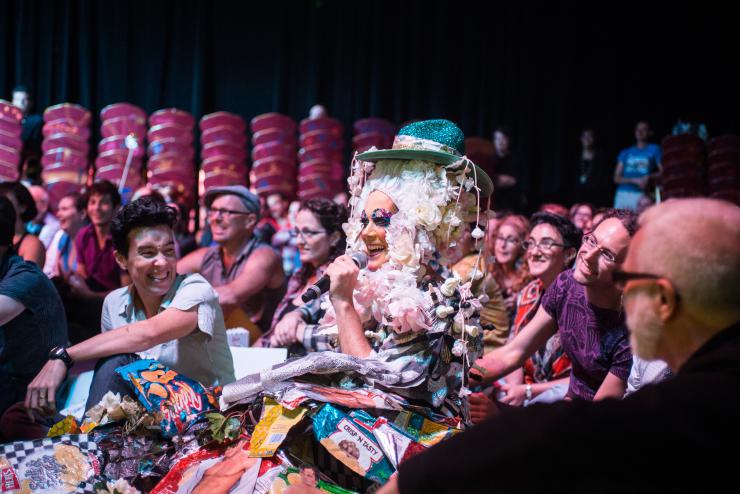
24. … So. This is the show I saw:
25. A communal, intelligent, erotic, participatory, spectacular performance art concert, a highly subjective history of these rarely United States and the songs we played and sang, danced and fucked to; a marathon survey dedicated to destroying through exposure the racism, patriarchy, supremacy, and fascism suppressing the fabulosity of all our country’s different beleaguered Others over the years. Notable among these Othernesses—since this is nearly the very first time I have witnessed (and been included in) this very specific theatrical agenda—is the shadow history of effeminate men in America: dandies, poofs, nellies, faggots, queers; their reclamation as people who are 1) sexual, sexy, etc.; 2) fabulous, beloved because of their gender play/fusion/failure/fuckery; 3) perhaps, as Taylor sang in Patti Smith’s “Birdland,” not human, because being human is pretty boring.
26. And besides that, it was just the best party I’ve ever been to, and the most bliss I have ever, ever felt. I mean—I got misty during the first song because I was just so happy to be there, in that room, with six hundred tender comrades and something so big it could alter the course of (our) history.
27. “We do not need to ask permission to participate in the creativity of our own survival,” Taylor reminded us, all of us, in the early morning hours, Sunday morning, church; we’ve by now come through over two hundred years of time, emerging from the backroom, love has torn us apart but we’re building each other back together, weary, unrested, split open, basking in the light of Taylor’s split-open performerhood, “I want to reach people through my falling apart,” very near the end of the whole thing, which would only be the beginning of the rest of our lives as queer disciples, daughters of judy, celebrants, not-humans, fuckers-of-form, artists all, who, now, knew what we needed to do and could do with art and our queer performer selves to reach the people, who, as Taylor sang, and Patti before judy, have the power.

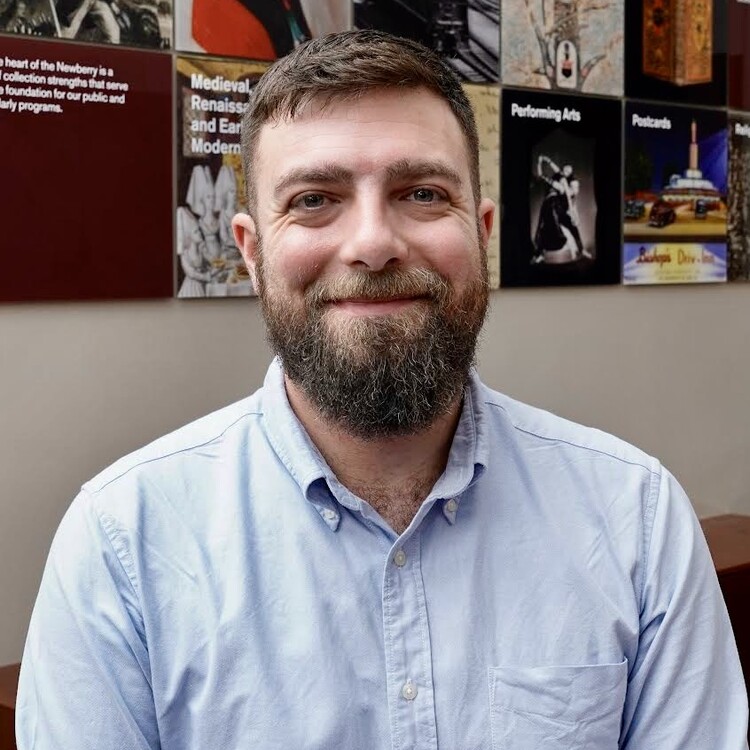
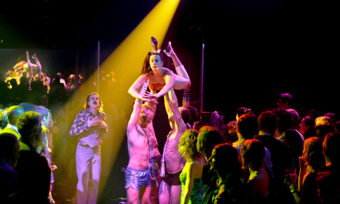

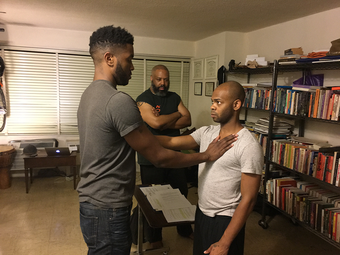

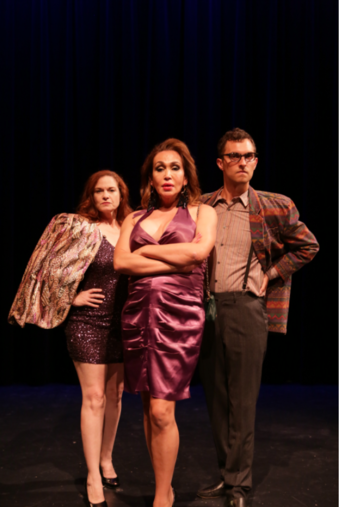


Comments
The article is just the start of the conversation—we want to know what you think about this subject, too! HowlRound is a space for knowledge-sharing, and we welcome spirited, thoughtful, and on-topic dialogue. Find our full comments policy here
I am going to be a Dandy Minion for the Melbourne production of this in October and I've been researching the hell out of this show. Every piece of writing about it just blows my mind more and more. I'm still flabbergasted that I was chosen to be a part of this, and I really really cannot wait for the show. This piece, even and especially the parts that aren't about judy specifically, is incredibly powerful and relatable as a queer minority myself. Thank you for this.
Perfectionism is for assholes --Taylor Mac Also: you can lie down and die, or get up and play.
Thanks for bringing me back to that wonderful day and night.
Thank you for being there with me and judy and all of us. // xocj
#13 forEVER. Thanks for this!
Pass it on; spread the word; people have the power, ever and always...
I still think about it every single day. It changed my life and the way I look at art and activism. I've been hoping to write something about it, too. (Besides my parody Craigslist missed connection!) If I do, I'll post a comment with a link. This was a beautiful reflection about some of the most meaningful 24 hours of my life and I'm sure yours, too. Thank you for sharing it.
I think I saw that missed connection...
thank you for reading, queen // xocj
This is a glorious piece of writing - thank you for capturing the performance, your experience of it, and its place in performance and cultural history so beautifully and incisively!!
Thank you for reading - it was so huge and important, it couldn't (can't, won't) stay in just that room on that day. // xocj
Just closing the loop - I just saw the two 12-hour version of the show in Philadelphia - and agree with all you wrote about it! So glorious, so moving, so mind-shifting, and such a wonderful sense of communitas and spirit gets built in that room. Life-altering.
Yep. It was magnificent. Defiant. Triumphant.
glad to have shared it with you, & everybody.